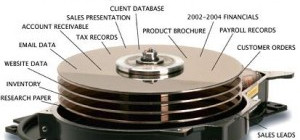 With the advent of computer technologies taking over our private lives, the way we deal with our private data has evolved. Whilst some of us will still use paperwork and folders, a lot of people are switching to electronic data as being the main method of storing and accessing their private information. From words documents to bank statements, going through digital photos; all those forms of digital data need to be stored so that we can access them and more importantly so that we may never lose them. And when it comes to data storage, there are now many different methods we can use to ensure that data doesn't get lost.
With the advent of computer technologies taking over our private lives, the way we deal with our private data has evolved. Whilst some of us will still use paperwork and folders, a lot of people are switching to electronic data as being the main method of storing and accessing their private information. From words documents to bank statements, going through digital photos; all those forms of digital data need to be stored so that we can access them and more importantly so that we may never lose them. And when it comes to data storage, there are now many different methods we can use to ensure that data doesn't get lost.
Computer Hard drive storage.
The most direct and easy method is to save our data on our computer's hard drive. This makes our data easy to access and makes it secure enough providing our computer is pass worded. However using this method can put our data at a considerable risk. Hard drives do fail and short of using a professional company to assist in recovering your hard drive data, that data could be very hard to recuperate in the advent of hardware failure. Hard drives which run operating systems are at higher risk of failing as the hard drive is very often running (mechanical wear); but also more likely to be a victim of online viruses and malware.
Using a spare drive.
Because our main operating system hard drive is at higher risk of fault, the best is to buy a separate hard drive, preferable an external USB based one. Information can then be saved to it regularly, ensuring that we have an up to date and spare copy of our data. Using this method also means that we can take that hard drive with us if we need to carry our data somewhere else than our homes or offices, making it easy to share with others if required. However, even external hard drives are at risk of failure, especially when being transported around. After all, most hard drives that are not flash memory still contain moving mechanical parts which can be affected by transport and movement.
Online storage methods.
Because of the risks involved in losing hard drive data, a method of online storage has emerged over the years, better known as cloud storage. Services such as Google Cloud Platform allow us to store our data safely onto their own servers. This has many advantages, starting with ease of access. Using such method allows us access to our data from any remote computer, providing of course we have the right credentials. Not only is the access easy but also secure. Reputable online cloud services work hard to make sure their servers cannot be hacked, and they also use enough precautions to ensure that our data is still accessible even in the advent of one of their servers failing.
Whichever works for you best?
Keeping hold of your data will require some sort of regular maintenance, whichever method you decide to use. Some of us value privacy over all, in which case a spare hard drive will probably work best as the data will stay in-house. For others, accessibility and flexibility is more important. Those who favour being able to easier access their data should probably use online cloud services. Depending on the desired outcome, there is always an ideal solution. By measuring your privacy needs against your flexibility needs, you should be able to determine which method of data storage is best suited to you.







